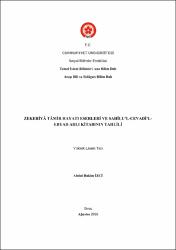| dc.contributor.advisor | Yılmaz, Ali | |
| dc.contributor.author | İzci, Abdul Hakim | |
| dc.date.accessioned | 2020-02-27T09:10:44Z | |
| dc.date.available | 2020-02-27T09:10:44Z | |
| dc.date.issued | 2016 | tr |
| dc.date.submitted | 2016-07-20 | |
| dc.identifier.other | XI, 153 sayfa | |
| dc.identifier.uri | https://hdl.handle.net/20.500.12418/12305 | |
| dc.description.abstract | Her toplulukta olduğu gibi Araplar arasında da çok eskiden beri bir takım menkıbeler, masal ve hikâyeler bulunmaktaydı. Ancak modern anlamda Arap kısa hikâyeciliği on dokuzuncu yüzyılın ortalarından itibaren Batı ile karşılaşmanın sonucu olarak, Batı edebiyatındaki örneklerine yakın olan çalışmalarının verilmeye başlamasıyla, Suriye'de modern hikâye ortaya çıkmıştır. Bu çerçevede ortaya çıkan Zekeriyâ Tâmir, Modern Arap kısa hikâyesine farklı tarz katmış, Suriye edebiyatının ve Arap âleminin kısa hikâye alanında en çok okunan ve eserleri farklı dillere çevrilen önemli kısa hikâye yazarlarından biri olmuştur. Tâmir, 1931 yılında Suriye'nin Şam şehrinde doğmuş, tahsiline maddî imkânsızlıklar nedeniyle ilköğretim aşamasında bırakmak zorunda kalmış olsa da o, hayatın zor şartlarına teslim olmamış kendini yetiştirmiştir. Bu yetişme sürecinde, Dünya Modern Edebiyatından Jean-Paul Sartre, Franz Kafka, Albert Camus ve dünya edebiyatına etki eden diğer yazarların eserlerini de okuyup etkilenen Yazar, daha ziyade sosyal, siyasî, toplumsal ve kültürel içerikli hikâyeler yazmıştır. Hikâyelerinde romantizm, İzlenimcilik, saçmacılık, dışavurumculuk ve sembolizm gibi anlatım tarzını görmek mümkündür.Biz de çalışmamızda Arap Edebiyatında Kısa hikâyeciliğinin önemli isimlerinden biri olan Suriyeli Zekeriyâ Tâmir'in hayatını, düşünce yapısı ve eserlerini okura tanıtmaya, sahîlu'l-cevadi'l-ebyad (Beyaz Atın Kişnemesi) adlı hikâye kitabını Türkçeye çevirisini yaptıktan sonra da tahlilini yaptık. | tr |
| dc.description.abstract | As in every community among Arabs since time immemorial are some tales, fairy tales and stories were being told. Arabic short story writing in the modern sense, however, as a result of the encounter with the West since the middle of the nineteenth century, which is close to the start of the work to be given to the example in Western literature has emerged in the modern history of Syria.In this context fully emerged in the modern Arab Zekeriyâ Tâmir it has added different style short story, the most widely read short stories and works in the field of literature of Syria and the Arab world has been one of the most important writers of short stories translated into different languages. Tâmir, born in the Syrian city of Damascus in 1931, though he had to leave the primary stage due to financial difficulties in the collection, he has trained himself never delivered to the difficult conditions of life. In this growth process, the World Modern Literature from Jean-Paul Sartre, Franz Kafka, Albert Camus and affected by reading the works of influencing other writers to world literature authors, rather than social, political, wrote social and cultural content of the stories. Romance in the story, Impressionism, nonsense, it is possible to see as the narrative expressionism and symbolism. In our study Arabic literature in short story writing of prominent figures from one of the Syrian Zekeriyâ Tâmir's life, to introduce to the reader the mindset and work, sahîlu'l-cevadi'l-ebyad (White Horse whinny of) the story book into Turkish we have made the then analyzed whether the translation. | tr |
| dc.language.iso | tur | tr |
| dc.publisher | Sivas Cumhuriyet Üniversitesi-Sosyal Bilimler Enstitüsü | tr |
| dc.rights | info:eu-repo/semantics/openAccess | tr |
| dc.subject | Suriye | tr |
| dc.subject | Kısa Hikâye | tr |
| dc.subject | Öykü | tr |
| dc.subject | Modern Arap Hikâyesi | tr |
| dc.subject | Modern Arap Edebiyatı | tr |
| dc.title | Zekeriyâ Tâmir Hayatı Eserleri ve Sahîlu'l-Cevadi'l-Ebyad Adlı Kitabının Tahlili | tr |
| dc.type | masterThesis | tr |
| dc.contributor.department | Sosyal Bilimler Enstitüsü | tr |
| dc.relation.publicationcategory | Tez | tr |















